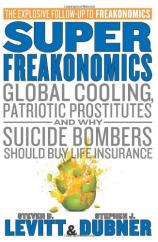Superfreakonomics: Global Cooling, Patriotic Prostitutes and Why Suicide Bombers Should Buy Life Insurance
Review
Superfreakonomics: Global Cooling, Patriotic Prostitutes and Why Suicide Bombers Should Buy Life Insurance
Following up on their entertaining and thought-provoking book on
economics for non-economists, Steven D. Levitt and Stephen J.
Dubner repeat their successful formula with this sequel. The theme
throughout both titles is that people are more likely to follow a
lifestyle or activity if there’s a positive
“what’s in it for me” outcome.
“Incentive” is the key word, whether it’s doing
something outwardly altruistic or, conversely, not doing
something that would have a negative outcome. Some of it is
heartening, some discouraging:
“Most giving is, as economists call it, impure
altruism or warm-glow altruism,” they write.
“You give not only because you want to help, but because it
makes you look good, or feel good, or perhaps feel less
bad.”
Wow. Where’s the love?
Levitt, the economist, and Dubner, the writer, work well
together. They ponder on a series of seemingly general questions
that takes the reader on an ever-expanding journey as ancillary
factors come into play in an almost stream-of-consciousness manner.
What starts out as unrelated material soon comes together like a
well-knitted sweater.
Simply glancing at the table of contents tells a sequence of
stories in itself: “Chapter 2: Why Should Suicide Bombers Buy
Life Insurance? In which we discuss compelling aspects of birth and
death, though primarily death” (to be sure, there is a lot of
death here, caused by terrorists or Mother Nature or egotistical
doctors who believe they can do no wrong). The description
continues: “The worst month to have a baby,” which
extends to “The natal roulette effects of horses, too”
and how their planned parenthood can affect the pool of
thoroughbreds available for races like the Kentucky Derby. >From
there, the chapter migrates to the accuracy of the alphabet as a
predictor of a child’s success (A is better than Z when it
comes to surnames), which in turn leads to a declaration of why
better athletes are born earlier in the year. The tangential
threads linking one topic to the next might appear bizarre, but one
“a-ha moment” follows another, and many of the ideas
seem like common sense once you finish each anecdote.
Of particular “use” is the section of the health
industry, how the simplest practice of personal hygiene can be
heralded as saving millions of lives, and how the quality of a
doctor should be measured (hint: the answer can’t be found in
a magazine article rating the best ones). On the other hand, the
chapter on global “cooling” is soul-sucking when the
writers declare that even if every world citizen stopped
environmentally bad behavior (which will never happen --- back to
altruism or the lack thereof), the earth may still be in a
predicament from which it can never recover.
While the stories are fascinating, some of the background and
methodology can go on a little long. Still, it’s a small
price to pay for such a refreshing book. I’m already looking
forward to the third installment. In the meantime, I’ll mosey
on over to the Freakonomics blog at NYTimes.com to get, well, my
“freak-on.”
Reviewed by Ron Kaplan (RonK232@comcast.net) on January 23, 2011
Superfreakonomics: Global Cooling, Patriotic Prostitutes and Why Suicide Bombers Should Buy Life Insurance
- Publication Date: November 1, 2009
- Genres: Economics, Nonfiction, Popular Culture
- Hardcover: 288 pages
- Publisher: William Morrow
- ISBN-10: 0060889578
- ISBN-13: 9780060889579






